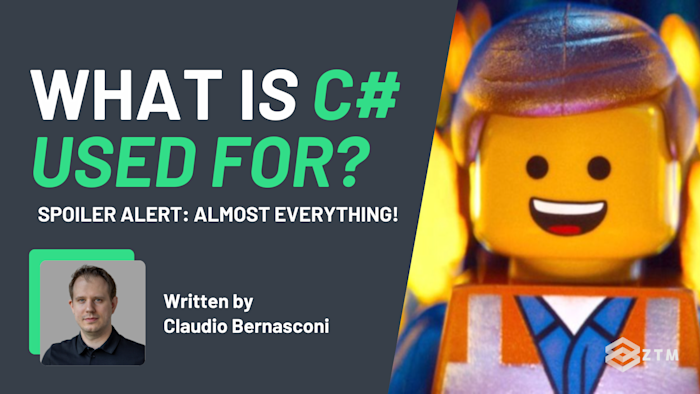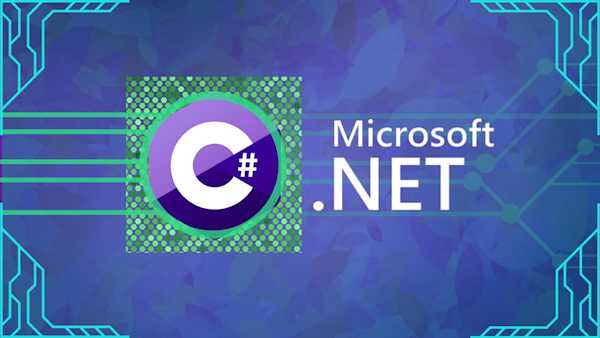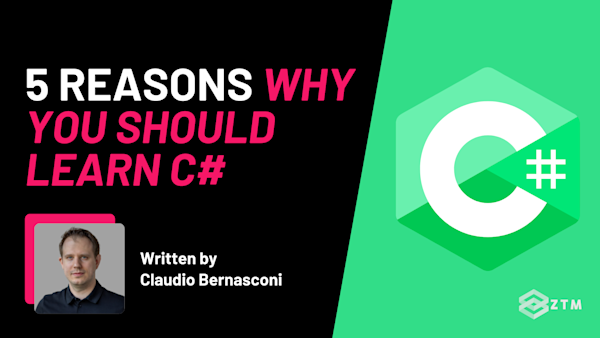C# is a simple, general-purpose, and fundamentally object-oriented programming language for the .NET platform. It follows clear standards, utilizes strong typing, and manages memory using garbage collection.
That’s not the only benefit though. The .NET platform is incredibly secure, provides a great runtime performance, while the C# compiler, (combined with Visual Studio or JetBrains Rider), provides a great developer experience.
It's a veritable buffet of benefits!
And because modern .NET is cross-platform, it means you can use C# to develop applications running on different operating systems and different kinds of devices, including Internet of Things (IoT) solutions, as well as client and server applications.
Common examples are:
- Desktop Applications
- Web Applications
- Cloud APIs and Integrations
- Enterprise Cross-Platform Applications
- Mobile Development
- Game Development
- Task Automation, and more!
In this article, we’ll take a deeper into each of these areas, along with some additional benefits, examples, and reasons why C# works so well in each area.
So let’s dive in!
Sidenote: If you want to learn more about C#, then check out my C#/.NET Bootcamp course.
This is the only course you need to learn C# programming and master the .NET platform. Plus, Claudio just recently added a massive new sections to teaching your how to build web applications with ASP.NET Core MVC, Razor Pages, and Blazor.
No previous coding experience required - you’ll learn C# programming from scratch, including powerful skills like data structures, object-oriented programming (OOP), and testing. All while building your own projects, so you can get hired as a C#/.NET Developer in 2025!
Click the image above to check it out, or just start watching the first few lessons here for free (no signup or credit card needed, just start learning).
Anyways, with that out of the way, let’s get into the guide and see why C# is so awesome at some many things!
C# use case 1: Cross-platform Desktop Applications
One of their biggest strengths of C# for desktop applications is cross-platform support.
This means you're not limited to running your applications on Windows - they also work on macOS and Linux.

The .NET platform provides Windows Forms and WPF as established Windows desktop development frameworks, while AvaloniaUI and Platform Uno also provide strong cross-platform options. Avalonia 11 is now the best open-source alternative to WPF, with full cross-platform support.

C# use case 2: Web Applications
C# works great for web applications, and has a heap of options to help you build.
In fact, ASP.NET Core is incredibly flexible, allowing you to use the approach that fits your programming style and your web application's requirements best.
Want to build an app?
A lot of popular apps are built using C#, such as:
- Microsoft Office Suite
- Microsoft Outlook
- Microsoft Skype
- Microsoft Teams
- AutoCAD
- GitHub Desktop
- Paint 3D
- Paint.NET
- JetBrains Rider
Want to build a single page app?
The ASP.NET Core Web Framework is built on .NET, which allows for building rich UI web applications such as single-page applications.
As well as ASP.NET Core MVC and Razor Pages, you also have Blazor which allows you to build modern single-page applications using a component-driven programming model.

In fact, with .NET 8, Blazor allows you to decide the rendering mode on a component level!
This means that you can have a fast initial download of your website or web application, as well as rich interactivity for specific components using a web socket connection and server-side rendering (Blazor Server) or client-side rendering using web assembly (Blazor + WebAssembly).
Zoom zoom!
Want to build a backend?
If all you want to build is a backend, you can easily use a REST API with ASP.NET Core WebAPI, as it supports authentication, provides various security tools, and has fast performance.
C# use case 3: Cloud APIs and Integrations
If you want to quickly integrate a service with your application, Azure Function or AWS Lambda are great cloud-native services you can develop using C#.

And the best part?
You don't even need to create and host a whole application! Instead, you only write the business code that transforms your data or calls the remote API you consume.

C# use case 4: Enterprise Cross-Platform Applications
Enterprise-grade software requires complex architecture and multiple integration with other services, APIs, or UI components.
Good news for us, is that the .NET ecosystem provides more than 300,000 Nuget packages containing reusable building blocks for your application.

All these C# class libraries make sharing code between internal and external applications so easy. Once compiled, it can be integrated into all of your .NET applications.
Add in the fact that robust IDEs like Visual Studio and JetBrains Rider that work with C#, also provide tools to build scalable and long-term maintainable enterprise-grade applications, and you have a win:win situation for C# + Enterprise.
C# use case 5: Mobile Development
.NET MAUI is Microsoft's modern cross-platform framework for building mobile and desktop apps with C# and .NET. It replaces Xamarin Forms, offering better performance and native UI support.
These (and other 3rd party frameworks that we mentioned earlier) allow you to cross-compile C# code to native mobile applications with ease.
The most important benefits of using C# to build mobile applications though? You also get to work in a large open-source ecosystem, and the component-driven UI frameworks allow for simple user interface development.
C# use case 6: Game Development
Ignoring the whole debacle with the recent payment issues, Unity is still one of the most popular game engines for game development, and is written entirely in C#.
This means that if you ever want to change careers and build the next Stardew Valley, then you can use your C# programming knowledge to implement 2D and 3D games on a powerful modern game engine.

Fun fact: Stardew Valley was built as a side project by a single developer, and has grossed over $131.8 Million dollars on the Steam store alone!
Another added bonus for game devs using C#, is that you can reuse C# code developed for other projects, and you get strong typing, helping you prevent bugs. This means less effort and mistakes!
Finally, just like the other program categories on this list, you also have multiple options for game development. Besides Unity, you can also use C# to develop games based on the Godot game engine.
C# use case 7: Task automation
Got a repetitive task and want to save time on it, such as formatting a spreadsheet for a report?

Well, good news! C# is also able to to create automation tools and scripts for various purposes, including system administration, data processing, and testing.
C# console applications give you access to its vast ecosystem and powerful typing system, allowing you to build fast and maintainable task automation, saving you time, money, and sanity!
What will you build first with C#?
As you can see, C# allows you to build pretty much whatever type of application you need or want! This means you can learn a single language, and have access to building all of those different kinds of applications.
The trick is just learning and then deciding what to build!
P.S.
Don’t forget - if you want to learn more about C# as well as the .NET platform, check out my complete course:
No previous coding experience required - you’ll learn C# programming from scratch, including powerful skills like data structures, object-oriented programming (OOP), and testing. All while building your own projects, so you can get hired as a C#/.NET Developer in 2025!
It’s the only course you need to learn C# programming and master the .NET platform. You’ll learn everything from scratch and put your skills to the test with exercises, quizzes, and projects!
Plus, once you join, you'll have the opportunity to ask questions in our private Discord community from me, other students, and working developers.
There's always someone online 24/7 happy to help. It's by far the thing that my students always tell me is the best part of their experience. Hope you decide to take my course and if you do, make sure to come say hi on Discord!
Check it out above, or watch the first few videos here for free.
Like this guide? Get more C# content below!
Check out these other C# guides and tutorials (All with code examples!)







